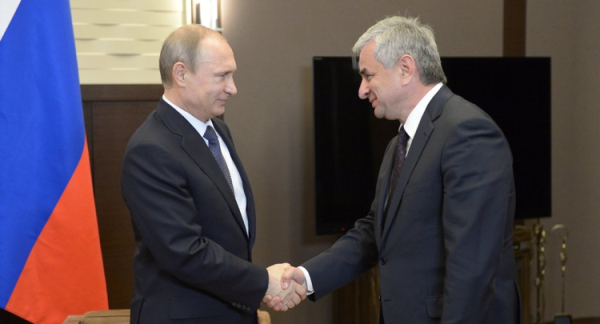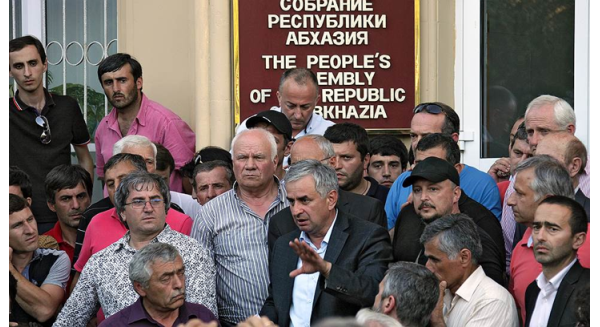Power and money
1. Financial aid that has not reached Abkhazia

Raul Khajimba and Vladimir Putin
It has already become a tradition, that any visit of the Abkhaz top official to Moscow or arrival of some Kremlin official in Sukhum/i causes just a mercantile interest in locals. ‘When will we get the money?’ – is the most popular questions that has arisen in the context of Russian-Abkhaz relations not only in the outgoing year, but also in the past few years.
Since Russia’s recognition of its independence in August 2008, Abkhazia has become particularly dependent on Moscow’s financial investments in the local budget. Nearly half of the funds included in the budget accrue to Russian’s assistance. However, this year, the Abkhaz government has not finally received the pledged and documented subsidies from the Kremlin amounting to RUB 4 billion [about US$ 57million]. Only 7% of the total amount of the expected financial aid were transferred to Sukhum (and that was at the end of the year). As a result, in December, the local Parliament had to quickly adjust the budget, considerably cutting it.
Now the Kremlin promises to compensate the ‘shortage’ in the next year, adding it to RUB4 billion more tranches foreseen for 2016. If previously there should have been four billion rubles, now Sukhum can allegedly expect to receive eight billion.
Vladislav Surkov, Russian President’s aide, on Russian assistance to Abkhazia
2. Opposition’s protest wave

Rally in Sukhum
Local expert community explains that the fact that Abkhazia did not receive the aforesaid aid, which led to the budget deficit and, at the same time, caused serious economic problems, has triggered high degree of political instability, which has accompanied Abkhazia throughout the year.
Having held a number of congresses and conferences, the oppositional political organizations, united in a single bloc, have come to a common denominator, that the incumbent president of Abkhazia, Raul Khajimba, who failed to fulfill his campaign pledges, should leave his post ahead of time, three and a half years before the expiry of his term of office.
At the oppositional forum, held at Sukhum-based ‘Dynamo’ stadium in October, another blame was added to this claim to Khajimba – that he had come to power as a result of May 27, 2014 coup.
Now, the opposition has put forward an initiative to collect signatures for a referendum of confidence to President Raul Khajimba. Under the Constitution in effect, ten thousand signatures shall be collected to conduct a plebiscite.
Aslan Bzhania, an individual opposition leader, delivers a speech
3. Good holiday season
The outgoing 2015 will go down in the history of Abkhazia as the record year since the collapse of the Soviet Union by the number of tourists visiting the country. According to the government’s estimates, over three million people travelled to Abkhazia last summer either on holiday or as visitors from the nearby Sochi.
It was almost impossible to find a vacant room in a hotel or spa center in summer. Besides, according to an old Soviet tradition, great number of tourists spent their holiday in the private sector.
The Riza Lake and the New Athos Cave, that are two most profitable tourist facilities in Abkhazia, have almost doubled their incomes from tourists compared with the last year.

Sukhum embankment
4. Anti-Turkish sanctions
Serious aggravation of the Russian-Turkish relations, caused by downing of the Russia Su-24 bomber over the Turkish-Syrian border, was bound to have an impact on Abkhazia. Sukhum could not ignore the anti-Turkish sanctions, imposed by Moscow. It was the allied duty call to support Russia and Abkhazia actually did it despite incurring serious economic and political losses.
Twenty percent of Sukhum’s total foreign economic activity accrue to Turkey. Besides, about 500,000 ethnic Abkhazians, descendants of Muhajirs, who found themselves in a strange land as a result of the Caucasian War in the 19th century, currently live in that country.
5. Transition to a mixed electoral system
This year has turned out to be very productive in carrying out reforms. Parliament adopted a package of amendments related to the judiciary, local government, as well as introduced a new body – the Treasury. But the most significant and widely discussed amendment was a transition from a majoritarian to a mixed electoral system. Numerous compromises within the Abkhaz political elite made this transition very expensive and, therefore, extremely criticized. Was caused public discontent was not the transition to a new electoral system itself, but rather a decision to considerably increase the MP seats in future parliament from 35 to 55 mandates.



















